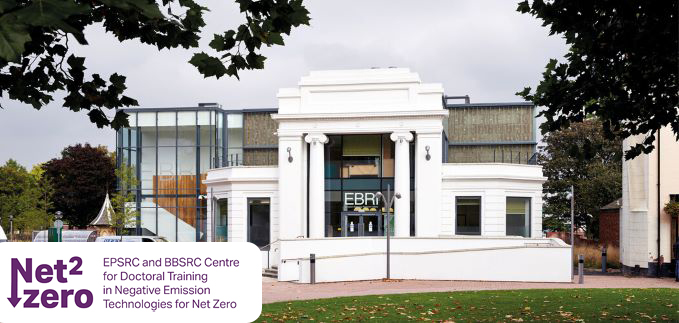<Press Release Published on behalf of Academic Partner, the Net2Zero Consortium, comprised of Queen's University Belfast, Aston University University of Nottingham, University of Warwick, and 25 other industrial partners >
- Consortium led by Aston University is to receive almost £11 million to open doctoral training centre
- Will focus on use of biomass to replace fossil fuels and removal of CO2
- “…part of the UK’s biggest-ever investment in engineering and physical sciences doctoral skills”.

Based at, and led by, Aston University, a consortium has received almost £11 million for a new Centre of Doctoral Training (CDT) which will focus on leading the UK towards net zero. The centre will bring together world-leading research expertise and facilities from Nottingham, Queens University Belfast, the University of Warwick, and more than 25 industry partners.
The funding has been announced by the UK Science, Innovation and Technology secretary Michelle Donelan. The centre is to receive almost £8 million of government money while the remainder will be made up through match funding and support from industry and the four universities. The government has described it as part of the UK’s biggest-ever investment in engineering and physical sciences doctoral skills, totalling more than £1 billion.
The Aston University centre will focus on the use of biomass to replace fossil fuels and removal (or capture) of CO2 from the atmosphere, with the potential to create new sources of fuels and chemicals. Integration of these two areas will lead to significant cost and energy savings.
Called NET2Zero, the centre will train PhD students across the full range of engineered greenhouse gas removal techniques including direct air capture, CO2 utilisation (including chemical and material synthesis), biomass to energy with carbon capture and storage, and biochar.
The students will work in the centre’s laboratories exploring the conversion of feedstock into alternative energy, improving conversion processes and measuring how the new technologies will impact the economy.
Supported by a range of relevant industrial, academic and policy partners the centre will equip students to develop the broad range of skills essential for future leaders in decarbonisation.
NET2Zero will be led by Professor Patricia Thornley, director of Aston University’s Energy and Bioproducts Research Institute (EBRI).
She said: “I am delighted that this centre for doctoral training has been funded. The climate emergency is so stark that we can no longer rely on demand reduction and renewables to meet our decarbonisation targets.
“If we are to have greenhouse gas removal options ready in time to be usefully deployed, we need to start now to expand our knowledge and explore the reality of how these can be deployed. This partnership of four leading UK universities with key industrial and policy partners will significantly augment the UK’s ability to deliver on its climate ambitions.”
“We are absolutely delighted to be working with our partners to deliver this unique and exciting programme to train the technology leaders of the future. Our students will deliver research outcomes that are urgently needed and only made possible by combining the expertise and resources of all the centre’s academic and industry partners.”
Science and technology secretary, Michelle Donelan, said: “As innovators across the world break new ground faster than ever, it is vital that government, business and academia invests in ambitious UK talent, giving them the tools to pioneer new discoveries that benefit all our lives while creating new jobs and growing the economy.
“By targeting critical technologies including artificial intelligence and future telecoms, we are supporting world class universities across the UK to build the skills base we need to unleash the potential of future tech and maintain our country’s reputation as a hub of cutting-edge research and development.”
Centres for doctoral training have a significant reputation in training future UK academics, industrialists and innovators who have gone on to develop the latest technologies.
The University of Nottingham’s Dr Eleanor Binner said: “We are absolutely delighted to be working with our partners to deliver this unique and exciting programme to train the technology leaders of the future. Our students will deliver research outcomes that are urgently needed and only made possible by combining the expertise and resources of all the Centre’s academic and industry partners.”
Her colleague Professor Hao Liu added: “We look forward to providing our best support to the NET2Zero CDT, including using our past and existing successful experience in leading other centres, to make this an exemplar.”
Overall, there will be 65 new Engineering and Physical Sciences Research Council (EPSRC) centres for doctoral training which will support leading research in areas of national importance including the critical technologies AI, quantum technologies, semiconductors, telecoms and engineering biology. The funding is from a combination of £500 million from UK Research and Innovation and the Ministry of Defence, plus a further £590 million from universities and business partners.
Surface Measure Systems is a partner at the Net2Zero
Centre for Doctoral Training, aimed to train the next generation of research
leaders tasked to remove greenhouse gases from the environment. Explore the Net2Zero
CDT and its opportunities to join a paid Doctoral Training Programme here
or contact cdt_net2zero@aston.ac.uk
with any queries.